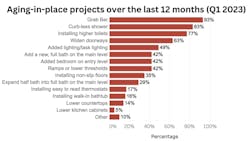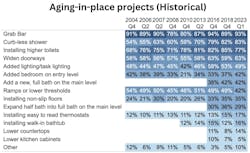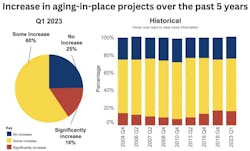Contractors Identify the Most Popular Aging-In-Place Projects
Aging adults want to stay in their homes—or at least, that’s what the data says.
In a 2022 study published by the American Association of Retired Persons, better known as AARP, data revealed that more than three quarters (77%) of adults over 50 “want to stay in their homes.” But while many aging homeowners want to stay in their homes, many worry about how well suited the structures are for the later years of their lives, admitting they’d need to make changes.
But what changes are needed exactly?
In a separate study from the National Association of Homebuilders, part of the Association’s Q1 2023 Remodeling Market Index, contractor members were polled on that very question—and several others related to the subject.
NAHB found, mirroring AARP’s data, that aging-in-place has been and continues to be a request contractors receive often. In 2023's first quarter alone, 63% of contractors said that they’ve done aging-in-place work. Of the clients asking for those services, 70% of contractors said that they’ve worked with 55 to 64 year old homeowners and 75% said that they’ve worked with clients 65 years and older.
In-Demand Aging-In-Place Features
As for what projects specifically these contractors are working on, the majority of work revolved around bathrooms. Over the last 12 months, 93% of contractors have installed a grab bar, 83% have installed a curbless shower, and 77% have installed higher toilets.
Source: NAHB
Of course, other projects around the home were commonplace, as well.
Nearly two-thirds of contractors have had to widen doorways, 49% have added task lighting, and 42% have needed to both add a more accessible bedroom and install ramps or lower thresholds.
A History and Future for Aging-In-Place Design
But not only have contractors witnessed this demand for accessible design over the last 12 months, it’s been a growing trend for decades.
Since 2004, when NAHB first started polling its members on aging-in-place, members have consistently reported increasing requests for accessibility features. And while we can’t say for certain these requests are going to continue into the future, it’s worth noting that the most significant increases in requests for aging in place features were reported in 2018 and 2023 (ie, the last two most recent times members were polled on the subject).
Source: NAHB



